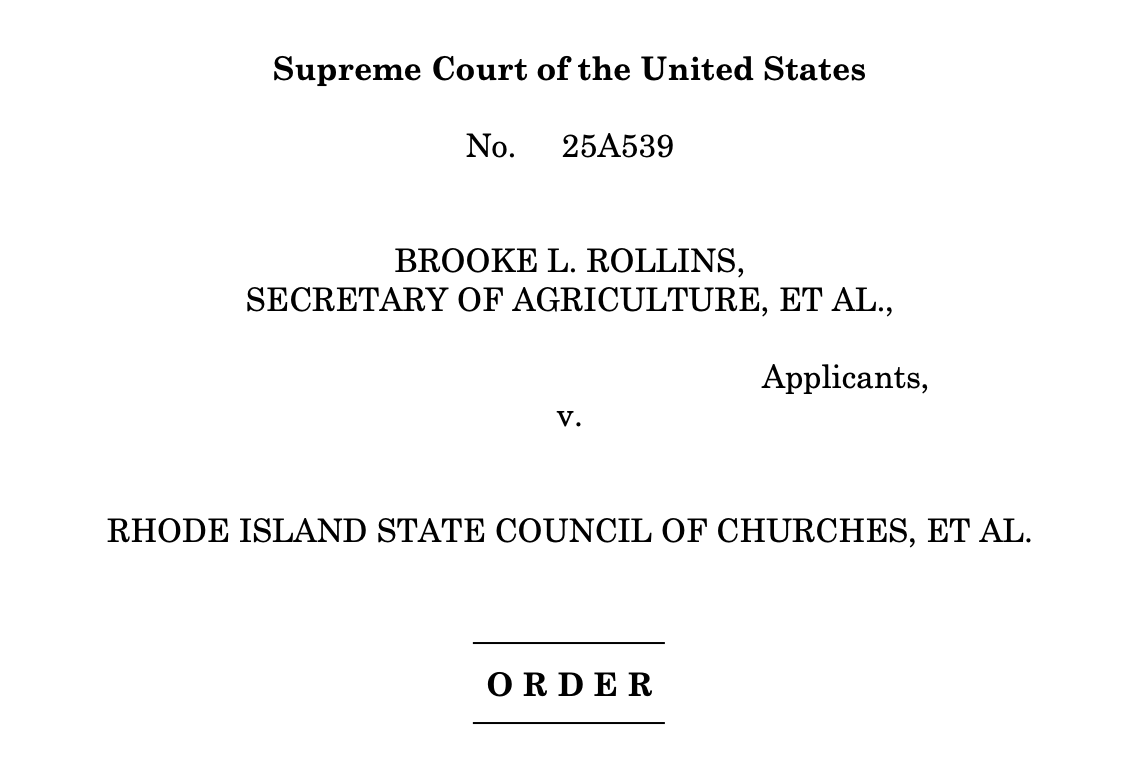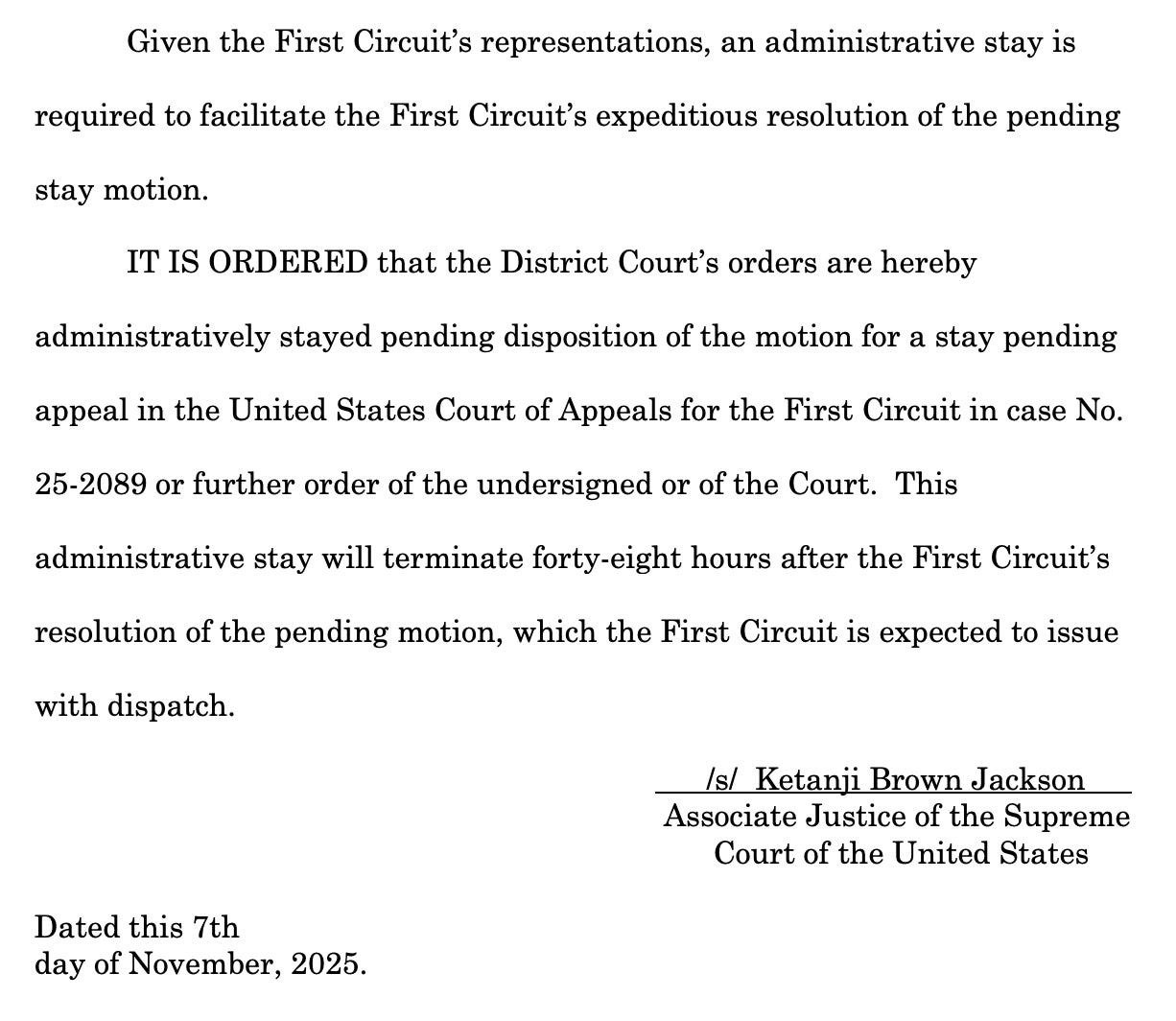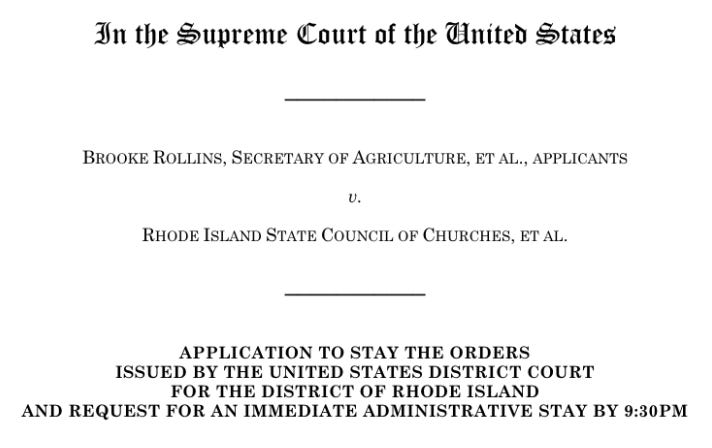Justice Jackson temporarily blocks SNAP benefits order to allow appeals court to rule
DOJ asked SCOTUS for a stay as USDA said it was completing its process for making full payments. Update: Jackson's order came a little past 9 p.m.
Update:
The Trump administration got a temporary reprieve Friday night from a district court order requiring it to make full SNAP benefit payments this month. The payments, under the district court order, would have needed to be made by the federal government by the end of Friday, prompting the Justice Department to engage in a flurry of litigation Friday evening.
Justice Ketanji Brown Jackson issued an administrative stay in the case, as was requested by the Justice Department, to provide time for the U.S. Court of Appeals for the First Circuit to rule on the Justice Department’s stay request in the case.
She noted that Trump administration officials “assert that, without intervention from this Court, they will have to ‘transfer an estimated $4 billion by tonight’ to fund SNAP benefits through November.”
Jackson wrote that she expected the appeals court to act “with dispatch” and stated that her administrative stay would end 48 hours after the appeals court rules.
The application was submitted to Jackson as the circuit justice for the First Circuit.
While it is hard to know what Jackson’s thinking was in issuing the order, it is possible that the rush of the litigation and the cost involved led her to want to just give a pause to let the process work its way through.
But, it is also important to note that, procedurally, had she denied the request, the Justice Department could have gone to another justice.
Finally, and perhaps most importantly, by issuing the order herself, she was able to set the limits.
This update was initially published at 9:45 p.m., with the final update at 10:45 p.m.
Original report:
On Friday evening, the Justice Department went to the U.S. Supreme Court to try and stop a district court order requiring the Trump administration to pay out full SNAP benefits this month.
Although a U.S. Department of Agriculture (USDA) official stated on Friday that it is “working towards” complying with the district court’s order that full payments for the month be made by Friday and that USDA would “complete the processes necessary” to do so “[l]ater today,” the Justice Department’s continued effort to get a stay suggests USDA would still stop completing those processes if it can get a stay.
At the Supreme Court, Solicitor General John Sauer told the justices, “Given the imminent, irreparable harms posed by these orders, which require the government to transfer an estimated $4 billion by tonight, the Solicitor General respectfully requests an immediate administrative stay of the orders pending the resolution of this application by no later than 9:30pm this evening.”
All of this as more than 40 million people entitled to Supplemental Nutrition Assistance Program (SNAP) benefits wait to see what their state, the Trump administration, and — now — the Supreme Court will do about their food benefits this month.
What happened?
On Thursday, U.S. District Judge John McConnell entered an order enforcing his prior temporary restraining order in the case brought in Rhode Island challenging the effort to stop SNAP benefits this month, as well as granting the plaintiffs — led by the Rhode Island State Council of Churches — a new temporary restraining order.
The Trump administration had been planning on issuing partial payments under McConnell’s initial TRO using the SNAP benefits contingency fund money available, but the plaintiffs objected to USDA’s decision not to still process full benefits. McConnell found that the reasons U.S. Department of Agriculture (USDA) gave for not using another batch of money — USDA’s Section 32 funds — to make up the different likely violated the Administrative Procedure Act as being arbitrary and capricious. As such, McConnell ordered full SNAP payments to be made, both by enforcing the initial TRO and by issuing a new, more direct TRO.
It was a belt-and-suspenders approach, as McConnell wrote in the new TRO that the Trump administration was being ordered “to make full payments of November SNAP benefits to the states by Friday, November 7, 2025, by utilizing available Section 32 funds in combination with the contingency funds.”
The Justice Department appealed to the U.S. Court of Appeals for the First Circuit, seeking an administrative stay and stay pending appeal. In its request, docketed a little before 9 a.m. Friday, it sought action by 4 p.m. Friday. The plaintiffs filed their opposition a little past noon.
When it hadn’t gotten a ruling by its arbitrary seven-hour “deadline” for a ruling, it went to the Supreme Court, asking the justices for an “immediate administrative stay” by 9:30 p.m. Friday.
Sauer, as DOJ had done at the First Circuit, blamed the whole thing on Congress.
"Congress has failed to appropriate funds to pay for Supplemental Nutritional Assistance Program (SNAP) benefits for this fiscal year. The Executive Branch has 2 since exhausted the entirety of its SNAP contingency reserve, which amounted to over $5 billion,” he wrote, not noting that even that was only done due to McConnell’s order.
Sauer continued: “But that will be only enough to cover partial payments for the month of November. Such a funding lapse is a crisis. But it is a crisis occasioned by congressional failure and one that can only be solved through congressional action.“
Shortly after the Supreme Court request was filed, the First Circuit denied DOJ’s request for an administrative stay. The appeals court has not, however, yet ruled on the stay request. I covered this development in a note:
DOJ informed the Supreme Court of that order shortly thereafter.
Check back at Law Dork for the latest developments on this breaking news story.






Pushy, aren’t they? Telling judges and justices when they want decisions. 1:11 anc counting til 9:30 Trump deadline.
I hope for once SCOTUS takes a pass and allows the appeals court decision to stand
Wow Funny he doesn't want to feed working class and low income families he wanted to vote for him.